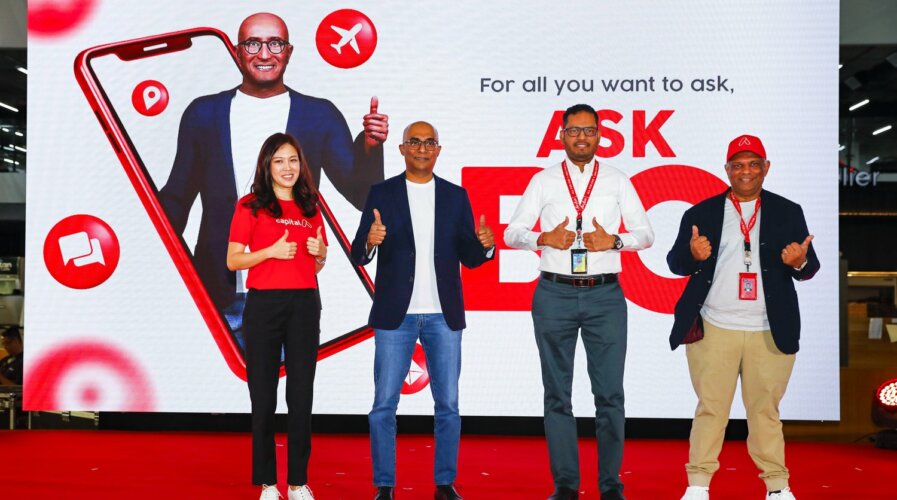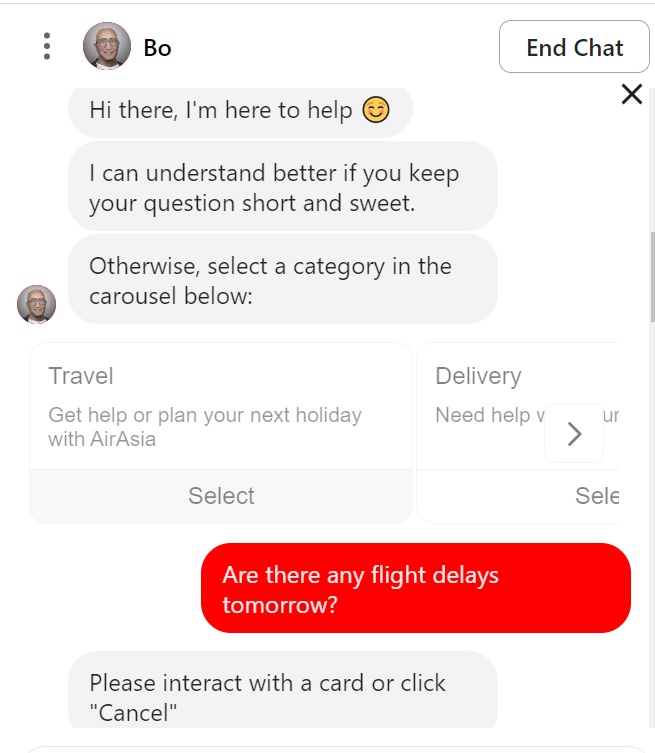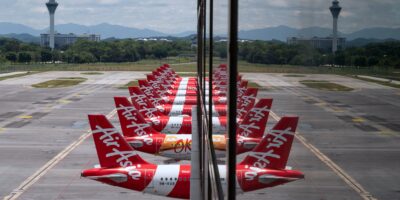
AirAsia replaces AVA with Ask Bo, a new AI-powered chatbot.
Can AirAsia solve its AI chatbot conundrum by replacing AVA with Ask Bo?
- AirAsia bid farewell to its first chatbot AVA and welcomed ‘Ask Bo’ which, according to the company, has enhanced AI and machine learning (ML) capabilities.
- AVA, since it went live for the first time in January 2019, has handled more than 113 million guests, with over 43 million queries at the peak of Covid alone.
Every disgruntled customer of Asia’s leading low cost airline, AirAsia, has had their fair share of frustration when it comes to dealing with AirAsia Virtual Allstar (AVA), the AI chatbot that has been around since 2019. After all, AVA was the face of the airline’s ‘help line’, with a live chat feature to respond to guest inquiries instantly – or at least that was the plan.
Even Tony Fernandez, CEO of Capital A, the parent company of AirAsia, knew of AVA’s infamous shortcomings. In an event held in Kuala Lumpur, he admitted “AVA was the most hated AI chatbot in Asean.” Fernandez echoed the sentiments of many and in return, he came with an alternative, a whole different AI chatbot to replace AVA.
“Our guests have spoken, and we are listening and learning. We felt their frustration towards our first AI chatbot, AVA, which was always a work in progress. We recognize she (AVA) fell short of people’s expectations, and we want to do better,” he said at the launch event for a new AI chatbot at AirAsia’s headquarters. For context, since January 2019, AVA has handled more than 113 million guests, with over 43 million queries in 2020, during the peak of Covid alone.
Despite the volume, AirAsia failed to keep customers satisfied with AVA – in fact, the AI chatbot is infamous for its unreliability and redundancies. So Fernandez went on ‘firing’ AVA and in exchange, introduced ‘Ask Bo’, the company’s second take on AI chatbot. He shared that over the last eight months, the customer experience team at AirAsia zeroed in on what guests need and want, and what their top complaints are.
“And today we are happy to introduce ‘Ask Bo’, named after our Bo Lingam,” he said, referring to the CEO of AirAsia Aviation Group. He shared how AirAsia has “learned through AVA how to use AI to answer complex and sizable queries better and faster”.
A newer AI chatbot with better tech or a mere rebrand?
According to AirAsia’s Chief Airport and Customer Experience Officer, Kesavan Sivanandam, the newly introduced virtual assistant comes with enhanced AI and machine learning (ML) capabilities after customers expressed frustration over the previous iteration of the chatbot. In response to a question by Tech Wire Asia during the launch event, Sivanandam said that AVA had been more of a ‘reactive’ AI chatbot, and Ask Bo have been made to be more “proactive.” On top of that, Ask Bo would include a variety of new features.
For starters, unlike AVA, Ask Bo will be able to provide live updates on flight status (delays, departures) and/or changes and boarding information. “He will send push notifications on any last minute changes on the day of operations, and give baggage information (tracking, arrival belt, mishandled baggage reports) and report real-time automatic updates of departure timings into the electronic Boarding Pass,” Sivanandam added.
Interestingly, Ask Bo is also promising “more autonomy” for AirAsia’s guests and that would mean they will be able to change flights, request refunds, choose service recovery options. The most significant difference from AVA would be that by next month, AirAsia’s guests will also be able to talk live to the company’s human agents, during the Ask Bo interaction.
While it remains to be seen if Ask Bo would be able to leave a good first impression to its users, all eyes would be on AirAsia’s latest attempt, especially after the first AI chatbot was “the most hated.” For many, Ava was only a bot that provided automated responses, providing no help otherwise.
Tech Wire Asia decided to test Ask Bo by asking it some basic queries. For now, the bot seems to still provide query-based replies. An interesting observation on the proactiveness of the chatbot is that it prompts users with a lot more options this time, making the process a lot more focused and faster to deal with as well.

A screenshot of Ask Bo
While the world moves towards more generative AI adoption, the technology used in Ask Bo still seems sufficient enough to meet customer demand at this point of time. The main concern would now be how much traffic can the bot support during peak periods and will it be able to detect queries that are bilingual, especially since AirAsia says they will add more language features in the near future. When it comes to interacting with live agents, Ask Bo has to be able to provide the agents with right information or customers may end up getting frustrated again.
One thing is clear for AirAsia; the low-cost airline has a lot to catch up on when it comes to its customer service, but is a functional AI chatbot all it takes to keep customers happy? We will have to wait and watch.
READ MORE
- 3 Steps to Successfully Automate Copilot for Microsoft 365 Implementation
- Trustworthy AI – the Promise of Enterprise-Friendly Generative Machine Learning with Dell and NVIDIA
- Strategies for Democratizing GenAI
- The criticality of endpoint management in cybersecurity and operations
- Ethical AI: The renewed importance of safeguarding data and customer privacy in Generative AI applications


